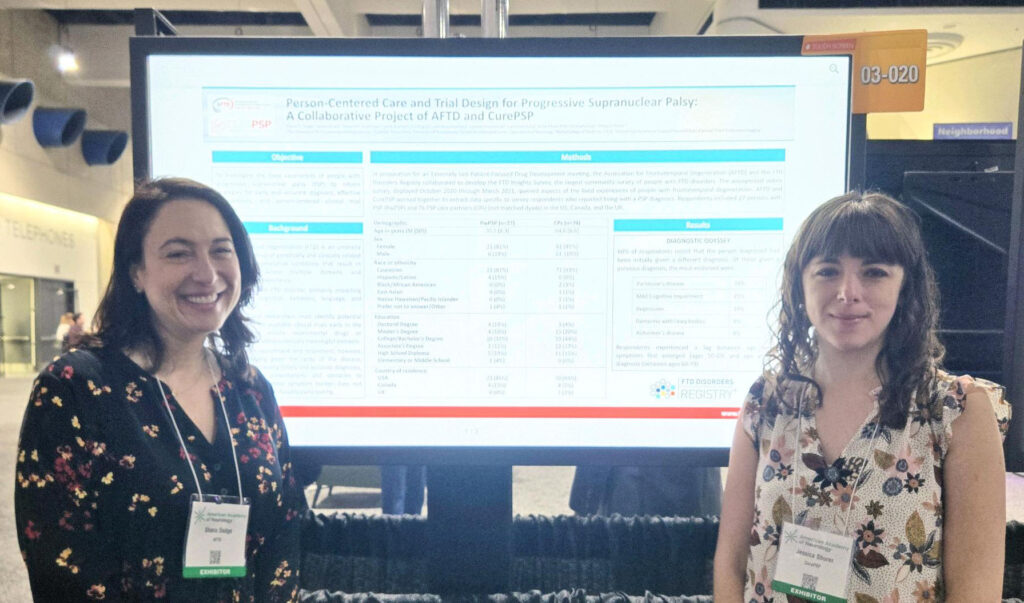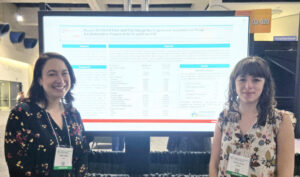PRESS & NEWS
Registry Data in Focus: Three Posters at AAN 2025

Data from the FTD Disorders Registry was presented in three posters at the April 2025 Annual Meeting of the American Academy of Neurology (AAN) in San Diego, CA.
At the April 2025 Annual Meeting of the American Academy of Neurology (AAN) in San Diego, data from the FTD Disorders Registry was presented in three posters, highlighting the importance of the Registry in advancing the understanding of frontotemporal degeneration (FTD) disorders.
 Mary Krause, Communications Manager for the Registry, represented the Registry’s poster on leveraging the direct-to-participant FTD Disorders Registry (FTDDR) to enable research on FTD disorders. The Registry’s poster highlighted how the Registry can accelerate research by capturing the lived experiences of those impacted by FTD disorders, enabling greater insight into disease progression, symptom burden, and care needs.
Mary Krause, Communications Manager for the Registry, represented the Registry’s poster on leveraging the direct-to-participant FTD Disorders Registry (FTDDR) to enable research on FTD disorders. The Registry’s poster highlighted how the Registry can accelerate research by capturing the lived experiences of those impacted by FTD disorders, enabling greater insight into disease progression, symptom burden, and care needs.
 Shana Dodge, PhD, Director of Research Engagement at the Association for Frontotemporal Degeneration, and Jessica Shurer, MSW, LCSW, CurePSP’s Director of Clinical Affairs and Advocacy, presented a poster on Person-Centered Care and Trial Design for Progressive Supranuclear Palsy: A Collaborative Project of AFTD and CurePSP.
Shana Dodge, PhD, Director of Research Engagement at the Association for Frontotemporal Degeneration, and Jessica Shurer, MSW, LCSW, CurePSP’s Director of Clinical Affairs and Advocacy, presented a poster on Person-Centered Care and Trial Design for Progressive Supranuclear Palsy: A Collaborative Project of AFTD and CurePSP.
Using the FTD Disorders Registry FTD Insights Survey, they investigated the lived experiences of people with progressive supranuclear palsy (PSP) to inform strategies for early and accurate diagnosis, effective interventions, and person-centered clinical trial designs.
The survey results revealed a complicated and lengthy diagnostic journey for individuals and families impacted by PSP. This delayed diagnosis made it challenging for people to participate in and benefit from research participation. Despite the obstacles they face, many respondents had a high interest in participating in clinical research.
They also found that when developing care plans for people with PSP, it is essential to consider the most distressing symptoms and their impact on daily functioning and quality of life. Neurology providers should also consider referrals to neuropsychological testing, rehabilitation therapies, clinical social work, and other supportive services. These resources can offer disease-specific education and compensatory strategies to help individuals with PSP and their care partners adapt to changes in cognition, communication, and independence.
 Finally, Devon Chenette, PhD, Medical Affairs Director at Alector presented an encore of their poster: Exploring Quality of Life Impact Reported by Caregivers in the FTD Insights Survey.
Finally, Devon Chenette, PhD, Medical Affairs Director at Alector presented an encore of their poster: Exploring Quality of Life Impact Reported by Caregivers in the FTD Insights Survey.
The analysis revealed that caregivers more frequently reported certain negative impacts, especially related to social activities, financial security, and intimacy with a partner, compared to the self-reports of those diagnosed. These differences may reflect the effects of reduced insight in individuals with an FTD disorder, underscoring the critical role caregiver input plays in fully understanding the burden of disease. The findings emphasize the need for more research to explore how FTD disorders affect daily life from multiple perspectives and to better characterize quality-of-life outcomes across the care journey.
Together we can find a cure for ftd
The FTD Disorders Registry is a powerful tool in the movement to create therapies and find a cure. Together we can help change the course of the disease and put an end to FTD.
Your privacy is important! We promise to protect it. We will not share your contact information.



